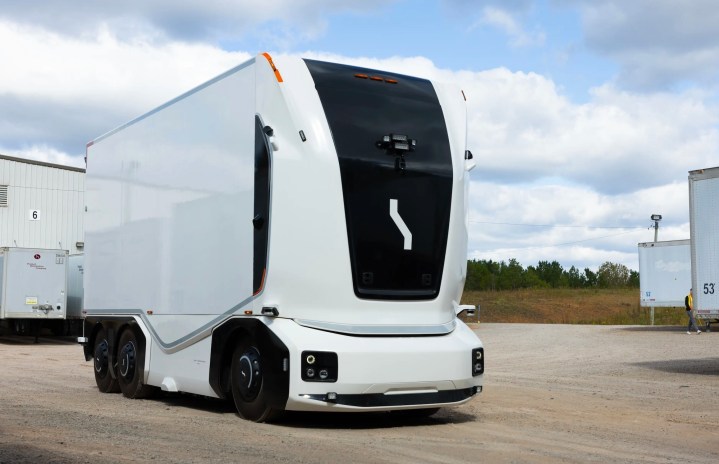
Autonomous trucking firm Einride has deployed its driverless vehicle at a GE Appliances facility in Selmer, Tennessee.
The electric, cabless truck is now undertaking full-time operations at the site, transporting finished products between GE Appliances’ manufacturing facility and its Selmer warehouse, Monday through Thursday.
The driverless, zero-emissions vehicle is conducting as many as seven shuttles a day along the 0.3-mile (0.48-kilometer) private road, Sweden-based Einride said on Monday.
GE Appliances was able to operate the unusual-looking truck on a full-time basis following a number of successful pilots, first in a gated environment at the company’s Appliance Park headquarters two years ago, and then on a public road in the U.S. last year.
The deployment is part of a broader initiative aimed at creating what GE Appliances describes as “an automated logistics flow” designed to improve employee ergonomics and safety around the loading docks while also increasing work efficiency.
The system involves other technology such as AI cameras that trigger the raising and lowering of the dock doors, and the Slip robot that loads and unloads the vehicle — a process that GE Appliances says reduces loading times by as much as 80%.
Last year, Einride shared a video showing the accuracy of its autonomous driving technology:
GE Appliances executive Harry Chase that using Einride’s autonomous vehicle technology is helping it to reduce emissions while allowing its workers to focus on more meaningful tasks. It also reduces challenging ergonomic tasks “like climbing on and off a forklift and hooking and unhooking trailers,” Chase said, adding: “We believe robotics and automation technology should work with and for people to improve their jobs.”
Henrik Green, general manager of autonomous technologies at Einride, said his company was “very proud” to partner with GE Appliance and “be able to lead the industry in providing autonomous technology.”
Einride showed off its first autonomous truck design in 2017 before developing subsequent versions that led to the current design.
Editors' Recommendations
- Cruise woes prompt production halt of fully driverless van
- GMC poured all of its truck-making expertise into the Sierra EV pickup
- Nissan’s high-tech ice cream truck removes the fumes from your order


